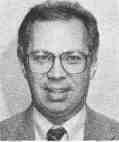|

|
THE TIMBER BRIDGE PROGRAM
By WILLIAM T. SUNLEY, Engineer of Local Roads and Streets
|
Timber bridges you ask? Haven't most of them
followed the same path as the steam driven locomotives, the Edsel and a 5 cent cup of coffee? The answer is a
resounding "NO". With over 41 percent of the 578,000
highway bridges across the nation needing repair or
replacement, a significant impact is being placed on the
economy. Technological advances in the treatment,
preservation and design of wood structures make the
timber bridge a safe and viable alternative material for
construction of bridges.
A construction program is available for building
timber bridges through the Intermodal Surface Transportation Efficiency Act (ISTEA) of 1991. The "Act"
provides an annual funding level of $7.5 million for
nationwide use through 1997.
In order to he eligible for the timber bridge program, candidate bridges must replace or be a rehabilitation of an existing structure on a public road. The
requirements for bridge lengths and load ratings are the
same for the Timber Bridge Program as those used for
other Federal bridge programs administered by the
Department. Replacement bridges must be of structural timber regardless of the type of bridge being
replaced. Questions relating to individual eligibility
should be addressed to your district Local Roads and
Streets office.
Only construction and construction engineering
costs are eligible for funding under this program. The
costs for preliminary engineering and right-of-way are
not eligible for funding. The federal share of projects
selected under this program is 80 percent of the eligible
cost. These funds are in addition to any other funds
coming to you. The remaining 20 percent match is left
to the Local Agency to cover using whatever non federal funds that may be available to them.
Projects submitted for consideration must be ready
to advertise for letting no later than the following August. FHWA has a mandate that any Timber Bridge
project not ready for letting by this date will lose its
federal participation.
The Federal Highway Administration (FHWA) will
request candidate projects from each state in late
summer. The Central Bureau of Local Roads and
Streets will contact all Municipal Engineers, Mayors,
County Engineers and Consulting Engineers for submittal of candidate projects at that time. Complete
instructions and application forms will be included
with the letter.
FHWA has developed the following four criteria for
selection:
A. Bridge designs which have both initial and long-term structural and environmental integrity.
B. Bridge designs which utilize timber species native to the state or region.
C. Innovative bridge designs which have the possibility of increasing knowledge, cost effectiveness and future use of
such designs.
D. Environmental practices for preservative
treated timber and construction techniques
which comply with all
environmental regulations will be utilized.
Please keep the four federal criteria in mind when
preparing your applications. The Central Bureau of
Local Roads and Streets receives all applications,
checks them for errors and forwards them to the proper
authorities.
The federal selection process requires several
months due to the program's national scope. After selection is made by FHWA, all applicants will be notified in writing of the results.
We in Illinois have already received benefits from
the Timber Bridge Program. Of the five projects Illinois
DOT submitted in 1992, three were selected for funding for a total of $496,000. At present, we are waiting for
notification on six projects submitted in 1993.
Since this program will remain in effect until the end
of the ISTEA in 1997, I encourage you to give serious
consideration to those potential candidates that could
utilize these funds.
You may want to get your projects ready now and
have them "on the shelf" in anticipation of the next
request that should be coming your way in August,
1994. Questions regarding this program may be directed to your district office or Dan Freeman (217-785-5178) in Springfield.
Credits to: Dan Freeman, Rural, Bridge, and Safety Programs Manager.
January 1994 / Illinois Municipal Review / Page 13
|